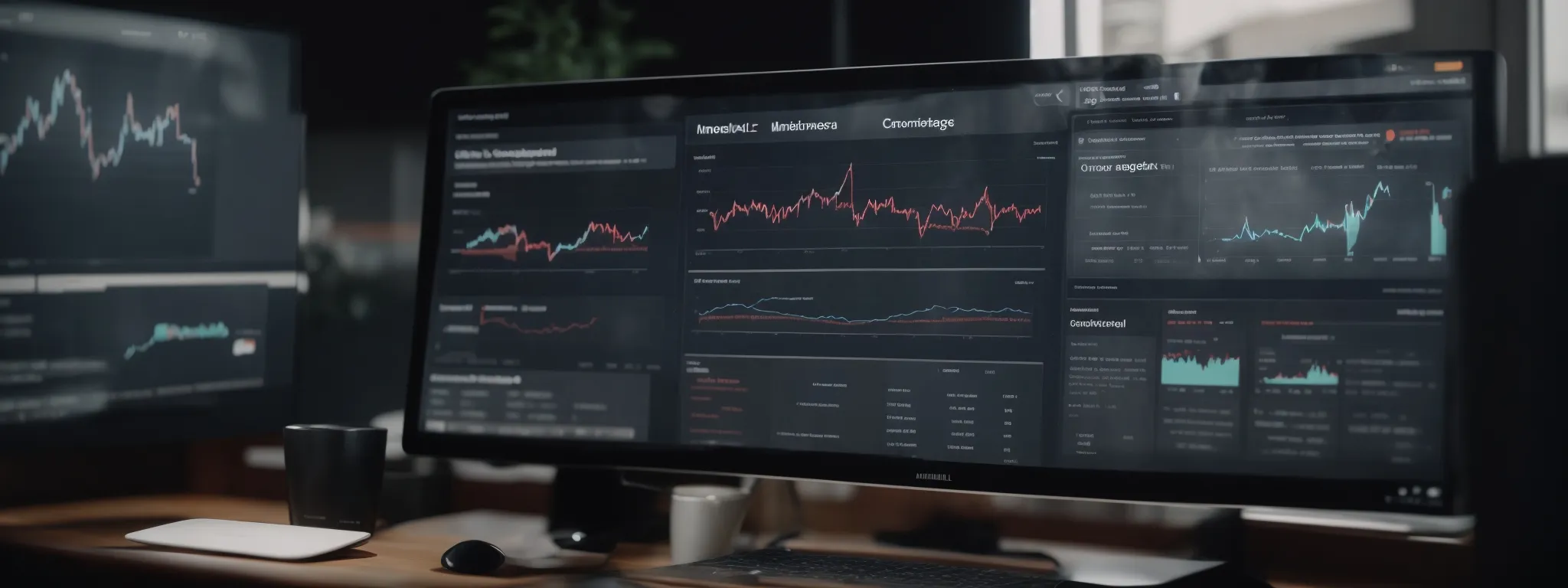Email Marketing Tools
Effective Email Marketing Tools for Business Growth Navigating the complexities of email marketing requires a fusion of innovative software and strategic finesse. Businesses aiming to amplify their […]
Effective Email Marketing Tools for Business Growth
Navigating the complexities of email marketing requires a fusion of innovative software and strategic finesse.
Businesses aiming to amplify their growth must harness the power of email marketing tools to engage customers, streamline campaigns, and glean insights from robust analytics.
Effective email tools not only simplify workflows but also elevate the connection between a brand and its consumer base through personalization and targeted content.
Crafting a successful email marketing plan involves selecting the right software that aligns with a company’s needs and scales with its ambitions.
Keep reading to uncover the key elements of potent email marketing tools that can propel your business to new heights.
Key Takeaways
- Effective Email Marketing Platforms Should Offer Intuitive User Interfaces and Robust Analytics for Campaign Management and Personalized Communications
- The Success of Email Marketing Relies on Technologies Such as Dynamic Content Builders, Responsive Designs, and Personalization Tags to Enhance User Engagement
- Integration of Email Marketing Software With CRM Systems Enables Personalized Customer Interactions and a Unified View of Customer Behaviors
- Adherence to Email Marketing Regulations Like GDPR and CAN-SPAM Is Crucial for Maintaining Subscriber Trust and Legal Compliance
- Artificial Intelligence Can Greatly Improve Email Marketing Strategies by Predicting Customer Behavior and Optimizing Send Times for Higher Engagement
Choose the Right Email Marketing Software for Growth

In an ever-evolving digital landscape, businesses seeking growth must latch onto robust email marketing strategies bolstered by powerful software.
Navigating the landscape of email marketing solutions requires a discerning eye for key features that propel effective campaigns forward.
As organizations weigh their options among top-tier email marketing platforms, they stand at the precipice of a vital decision—one that demands attention to scalability, an attribute indispensable for burgeoning enterprises.
The selection process hinges on matching the intricacies of one’s marketing needs with the capabilities of the software at hand, thereby ensuring a harmonious fusion of technology and business objectives.
Identify Key Features for Effective Campaigns
Embarking on email marketing without the right set of tools is akin to navigating a ship in uncharted waters. A robust platform should offer an intuitive user interface that simplifies the creation and monitoring of email campaigns, allowing businesses to focus on crafting messages that resonate with their audience rather than grappling with technology.
Central to an effective email marketing toolkit are advanced analytics and segmentation capabilities, which empower companies to deliver personalized communications tailored to distinct customer profiles. This level of customization is paramount in elevating the customer experience, driving engagement, and fostering long-term brand loyalty.
Compare Top Email Marketing Platforms
When the subject turns to the comparison of top email marketing platforms, one must consider a variety of factors that influence the overall effectiveness of campaigns. It is not simply about choosing a provider; rather, it is about finding the marketing automation platform that aligns with a business’s unique demands and goals.
| Feature | Importance | Examples of Top Platforms |
|---|---|---|
| User Interface | Critical for ease of campaign creation and management | Platform A, Platform B |
| Analytics | Essential for gauging campaign success and customer insights | Platform C, Platform D |
| Personalization | Key to increasing customer engagement and satisfaction | Platform E, Platform F |
Recognizing the imperative for comprehensive analytics and customization features, the best email marketing platforms offer these as part of their core functionalities. This provision allows businesses to cultivate a data-driven approach, engaging customers with precision and subtlety: clear distinguishers of a superior platform.
Select Tools With Scalability in Mind
In the contemporary arena of email marketing, tools equipped with scalability are the linchpins of an enterprise’s long-term marketing success. Forward-thinking businesses must prioritize email marketing software that boasts adaptive capacities, ready to expand with the business’s growing audience and evolving campaigns.
Selecting email marketing software that is not scalable can bottleneck an organization’s growth trajectory, restricting its ability to engage with an expanding customer base effectively. Businesses must scrutinize the scalability of a tool, ensuring it can handle increased loads and complex segmentation as campaigns become more sophisticated and user bases burgeon.
Automate Campaigns to Save Time and Increase Engagement

For businesses that aim to mature in the competitive market, harnessing email marketing tools adept in automation is a strategic move that can yield significant dividends.
Automation enables enterprises to maintain continuous and relevant dialogues with their audiences without manual intervention.
By setting up trigger-based emails, drip campaigns, and autoresponders, companies can ensure timely and effective communication that nurtures leads, encourages user engagement, and provides immediate responses to customer actions, further solidifying the foundation for sustainable business growth.
Set Up Trigger-Based Emails for User Actions
Engaging customers through timely communication fosters brand presence and bolsters conversion rates. Trigger-based emails are pivotal in this equation, as they initiate personalized messages in response to specific user actions, such as a purchase or cart abandonment, ensuring a business remains at the forefront of its customers’ minds.
Through the strategic deployment of trigger-based emails, companies are able to streamline customer interactions, offering them apt information and relevant offers precisely when they are most receptive to engagement. This approach not only optimizes the customer experience but also amplifies efficiency in marketing operations.
Utilize Drip Campaigns for Nurturing Leads
Drip campaigns stand as a cornerstone in the edifice of a strategic email marketing approach, specifically in nurturing leads. By systematically dispatching a series of targeted emails, businesses can guide potential customers along the sales funnel, subtly evolving from awareness to decision-making stages with the finesse that characterizes an effective campaign.
With the deployment of drip campaigns, enterprises manage contact touchpoints with assured regularity and context-specific relevance, thus cementing a connection with the lead. This method cultivates a sense of anticipation and continuous engagement, incrementally building towards the ultimate conversion with strategic precision and calculated cadence.
Implement Autoresponders for Immediate Responses
In the pursuit of operational excellence, businesses implement autoresponders to ensure instantaneous communication, a critical factor in maintaining customer engagement. This automated functionality acts as a tireless ambassador, extending a brand’s reach by providing immediate acknowledgment, support, and follow-up to client inquiries or actions.
As part of a comprehensive email marketing strategy, the use of autoresponders equips businesses to address customer needs promptly and consistently. The responsive nature of autoresponders solidifies the customer’s perception of a brand as attentive and dependable, fostering trust and encouraging repeat interactions.
Enhance Deliverability With Reputable Email Services

At the core of a successful email marketing strategy lies the paramount concern of deliverability—ensuring that crafted messages reach their intended recipients unfailingly.
Businesses endeavoring for growth must embark on a quest to partner with email service providers renowned for high deliverability rates, which hinge on sophisticated infrastructure and a sterling sender reputation.
It is incumbent upon these enterprises to be vigilant in monitoring and maintaining the health of their email lists, as a pristine list significantly mitigates the risk of falling into the dreaded abyss of spam folders.
These preemptive measures are the bedrock of establishing a reliable conduit for communication, ultimately fortifying marketing initiatives with unwavering consistency and reach.
Choose Providers With High Deliverability Rates
Selecting an email service provider with a proven track record of high deliverability rates is a critical step for businesses aiming to ensure their marketing messages consistently reach the inbox. Providers with robust delivery infrastructure and rigorous adherence to best practices serve as a lynchpin in the successful execution of email campaigns.
Companies must invest in email services that prioritize sender reputation and utilize intelligent delivery algorithms to navigate the complex landscape of spam filters and ISP regulations. This strategic approach maximizes the chance that emails will land where they have the most impact, directly in front of the intended audience.
Understand the Importance of Sender Reputation
In the intricate world of email marketing, sender reputation stands as an indelible hallmark, a measuring stick by which Internet Service Providers (ISPs) gauge the trustworthiness of an email source. Maintaining a positive sender reputation is crucial, as it significantly affects email deliverability and the probability of reaching a customer’s inbox.
The cornerstone of a commendable sender reputation takes root in ethical sending practices: steady volumes, consistent frequency, and engagement metrics that demonstrate recipients’ receptivity to the communications. A tarnished reputation can lead ISPs to mark emails as spam, casting a shadow over outreach efforts and undermining the efficacy of marketing campaigns:
- Regularly cleanse email lists to remove inactive subscribers.
- Implement authentication protocols like SPF, DKIM, and DMARC.
- Monitor feedback loops to quickly address any complaints.
Ultimately, a sterling sender reputation is not merely about avoiding emails from being categorized as spam; it is about creating a foundation of trust and reliability between a brand and its audience, directly impacting the success of email marketing strategies.
Monitor and Maintain Your Email List Health
The health of an email list is an essential aspect of any email marketing strategy. Companies that diligently maintain their email lists reap the benefits of higher engagement rates and superior deliverability.
| Strategy | Action | Impact |
|---|---|---|
| Email List Cleansing | Regular removal of inactive subscribers | Enhances engagement metrics and deliverability |
| Segmentation | Organize subscribers based on behavior and preferences | Delivers targeted content for increased relevance |
Through periodical audits to identify and segment active users, businesses can tailor their messaging and reduce the likelihood of unopened emails, which could otherwise signal ISPs to downgrade the sender’s reputation: a vital component in the journey towards optimized email marketing performance.
Segment Your Audience for Targeted Messaging

In an ever-competitive digital marketplace, the relevance and impact of email marketing campaigns hinge on a brand’s ability to engage with its audience through personalization.
Advanced segmentation is the arena wherein businesses conquer this challenge, carving out finely tuned markets from a broader audience, and ushering in an era of tailored messaging.
The power of segmentation lies in its capacity to transform generic communications into resonant, individualized interactions, utilizing subscriber data with precision.
As firms become more adept at segmenting their audience, they amass a wealth of insights, enabling ongoing refinement and optimization of their email marketing strategies.
Create Detailed Segmentation for Personalized Emails
For businesses aspiring to elevate their email marketing game, the integration of Detailed Segmentation is a pivotal strategy. Employing segmentation entails dissecting a company’s email list into smaller, more focused groups based on specific criteria such as purchase history, user behavior, or demographic particulars, thereby enabling the deployment of personalized emails that resonate profoundly with each unique segment.
The granular approach of detailed segmentation not only enhances the relevance of each communication but also amplifies the impact of every campaign. By leveraging data intelligently, businesses can craft emails that feel tailor-made for the recipient, leading to heightened engagement and fostering a deeper consumer-brand connection:
- Utilize purchase behavior to target customers with complementary product suggestions.
- Analyze engagement patterns to adjust email frequency and content style for different segments.
- Consider demographic details to customize messages that reflect the recipient’s lifestyle and preferences.
Use Segmentation Tools to Manage Subscriber Data
In the pursuit of precision in email marketing, segmentation tools are indispensable as they facilitate the management of diverse subscriber datasets. By utilizing these tools, businesses can automatically categorize their audience, ensuring each message is fine-tuned to the individual preferences and behaviors of the subscribers.
Effective subscriber data management through segmentation tools is critical for enhancing the impact of marketing campaigns. These tools empower companies to track interactions, fine-tune their strategy, and thereby increase the relevance of their communication efforts:
- Track user engagement to identify the most active segments and tailor future messages accordingly.
- Automate the segmentation process based on real-time data, streamlining campaign adjustments and aligning with consumer behavior.
- Utilize advanced filtering options to refine audience lists, ensuring that each campaign reaches the most appropriate subscribers.
Analyze Performance to Refine Segments Over Time
Continual analysis of email marketing performance is vital as it serves as the compass for segment refinement. By assessing the responsiveness of different segments to specific campaigns, businesses gain the insight needed to tailor their approaches, enhancing relevance and efficacy.
| Segment | Performance Metrics | Insights Gained | Refinements Made |
|---|---|---|---|
| Product Enthusiasts | Open rates, Click-through rates | High engagement with new product announcements | Increased frequency of product updates |
| Seasonal Shoppers | Conversion rates, Revenue per email | Spikes during holiday seasons | Targeted seasonal promotions |
Adjustments to segmentation become necessary as markets evolve and consumer behaviors shift. By actively engaging with performance analytics, organizations enhance their understanding of each customer segment, initiating a dynamic strategy that evolves in tandem with their audience’s preferences and needs.
Optimize Emails Using Advanced Analytics Tools

In the current digital marketing era, email remains a linchpin for cultivating customer relationships and driving revenue; however, its success hinges on meticulous optimization.
Savvy businesses employ advanced analytics tools to dissect each email campaign’s performance meticulously.
Tracking open rates, click-throughs, and conversions provides invaluable data, informing strategists where adjustments are necessary to amplify impact.
Through the strategic implementation of A/B testing, businesses refine their messaging, subject lines, and call to actions, continually elevating email effectiveness in a market where precision and adaptability govern the trajectory of business growth.
Track Open Rates, Click-Throughs, and Conversions
For businesses harnessing the power of email marketing, the importance of scrutinizing open rates, click-through rates, and conversion metrics cannot be overstated. These quantifiable indicators serve as a barometer for gauging the resonance and effectiveness of email campaigns, while also informing the strategic adjustments needed to optimize future engagements.
Armed with insights from advanced analytics, companies are better positioned to fine-tune each aspect of their email marketing efforts. Analyzing these critical metrics affords businesses the opportunity to elevate their campaigns, ensuring each email sent not only reaches the target audience but also prompts the desired action, thus driving measurable business growth.
Adjust Strategies Based on Email Campaign Analytics
As companies dissect the wealth of data gleaned from Email Campaign Analytics, they encounter opportunities to refine their strategies for improved performance. Decisions driven by such analysis include altering the copy of subject lines, timing email delivery to coincide with peak engagement periods, or tailoring content to reflect the discovered preferences of distinct audience segments.
Email campaign analytics serve as a compass, guiding marketers through the nuanced landscape of consumer behavior patterns. The information gained from metrics such as click-through rates and bounce rates propels firms to recalibrate their tactics, forging a direct path towards elevated open rates and amplified conversions, thus bolstering overall business growth.
Set Up a/B Testing to Improve Email Effectiveness
Embarking on A/B testing serves as a catalyst for elevating the potency of email marketing campaigns. Such strategic testing allows businesses to deploy variations of email content to subsets of their audience, thereby revealing the most effective elements that drive engagement and conversions.
By implementing A/B testing, companies discern which headlines captivate, which calls to action resonate, and which designs triumph, ultimately fine-tuning their campaigns for peak performance. This methodical approach to email optimization secures a competitive edge by elevating the user experience through tailored communication that reflects the preferences and behaviours of their clients:
| Email Element | Variation A | Variation B | Results |
|---|---|---|---|
| Subject Line | “Unlock Exclusive Savings Today!” | “Members-Only Discounts Inside!” | Variation B yields higher open rates |
| Call To Action | “Shop Now” | “Discover Deals” | Variation A generates more click-throughs |
| Email Layout | Image-Heavy Design | Text-Focused Content | Variation A leads to longer read times |
Integrate Email Tools With Your CRM for Better Insights

As businesses strive to fortify their email marketing endeavors, the symbiosis between email tools and Customer Relationship Management (CRM) systems manifests as a cornerstone of modern strategies.
Mastering this integration translates to a granular understanding of consumer behaviors, allowing companies to calibrate their outreach with unprecedented precision.
It is through syncing email marketing software with intricate CRM data that businesses craft personalized content that resonates.
Moreover, a seamless incorporation of these technologies offers an eagle-eyed view over the entire sales funnel, revealing the true influence of email marketing on customer acquisition and retention cycles—with these advanced insights, organizations can fine-tune their marketing efforts to drive substantive business growth.
Sync Email Marketing Software With CRM Systems
Integrating email marketing software with Customer Relationship Management (CRM) systems creates a more dynamic and responsive marketing environment. Such integration allows for the seamless transition of data between platforms, providing a unified view of customer interactions and behaviors across multiple channels.
This synergy of email tools and CRM systems is instrumental for businesses aiming to personalize their campaigns and deliver pertinent messages at optimal times. By syncing these platforms, companies enable Real-Time Updates and tracking of customer responses directly within the CRM:
- Real-time updates ensure immediate reflection of engagement activities and interest levels.
- Targeted messaging becomes more sophisticated through CRM’s detailed customer insights.
- Tracking of customers’ email interactions assists in refining sales strategy and follow-up procedures.
Moreover, when email marketing tools are integrated with a CRM, the result is a potent combination that bolsters the efficacy of marketing automation workflows. Communication strategies are thereby not only informed by past customer data but also shaped by current interactions and preferences, leading to a more productive and targeted marketing approach.
Leverage CRM Data to Tailor Email Content
Harnessing CRM data for email content customization allows businesses to achieve a closer alignment with individual customer journeys. This tailored approach, facilitated by the wealth of behavioral insights and detailed customer profiles provided by the CRM, creates a highly personalized email marketing experience that resonates with recipients on a new level.
By actively utilizing CRM data, businesses empower their email marketing campaigns with deeper relevance, thus enhancing customer engagement. The immediate result is a series of emails that not only inform and delight but also seamlessly echo each customer’s specific needs and preferences, laying the groundwork for increased conversion rates and nurturing long-term relationships.
Evaluate the Impact of Email on Overall Sales Funnel
Evaluating the impact of email on the overall sales funnel constitutes a critical exercise for organizations seeking comprehensive understanding of their marketing strategies’ return on investment. By analyzing conversion rates and customer engagement derived from email initiatives, companies chart the direct influence these efforts have on the progression from lead acquisition to final sale.
Through meticulous scrutiny of email-related metrics within their CRM, businesses discern not only the efficacy of their communication tactics but also how email campaigns interplay with other touchpoints in the sales process. This holistic analysis aids in pinpointing areas for optimization, ensuring email marketing remains a vital cog in the machinery of business growth.
Personalize Content Using Dynamic Email Builders

As businesses forge ahead in the competitive realm of digital marketing, the quest for personalized email interactions has become paramount to sustaining growth and captivating customer interest.
Dynamic Email Builders stand at the forefront of this pursuit, offering a kaleidoscope of design and personalization possibilities that can elevate a brand’s communication strategy.
Such tools enable marketers to implement dynamic content that adapts to individual user experiences, utilize responsive design to ensure consistency across various devices, and employ personalization tags, infusing each message with a sense of authenticity.
These sophisticated elements are essential for crafting emails that not only engage but also convert, harnessing the subtle art of personalization to forge deeper connections with the audience.
Implement Dynamic Content for Customized Experiences
Dynamic email builders stand as instrumental assets for marketers striving to deliver highly customized content. These advanced tools introduce the capability of serving different content to each subscriber based on their interactions, behaviors, and preferences: a revolutionary step towards true personalization.
- By recognizing and reacting to user data, dynamic content tools ensure every recipient feels valued with content that caters to their unique interests.
- Dynamic builders automatically adjust email content, reinforcing relevance and boosting the potential for engagement.
- Through varied content presentation, companies can test the effectiveness of different strategies to optimize customer interactions.
As personalization becomes non-negotiable in the realm of email marketing, dynamic content builders emerge as the architects behind genuinely individualized experiences. By utilizing these powerful tools, emails transform into personal conversations that reflect the recipient’s journey, fostering stronger connections and potentially increasing conversion rates.
Utilize Builders That Offer Responsive Design Options
In the quest for effective email marketing, utilizing dynamic email builders that offer Responsive Design Options stands as a vital strategy for ensuring maximum reach and engagement. These builders allow the creation of emails that automatically adjust to the screen size of various devices, providing a seamless viewing experience whether the recipient is using a desktop, tablet, or mobile device.
By prioritizing responsive design, businesses empower their email campaigns with the flexibility to cater to the contemporary consumer’s multi-device usage patterns. This adaptability enhances the user experience by guaranteeing that content is easily accessible and visually appealing, regardless of the device used to access the email:
| Device Type | Importance of Responsive Design | Impact on User Experience |
|---|---|---|
| Desktop | High | Ensures content is visually engaging on larger screens |
| Tablet | Moderate | Adjusts layout for touch-based navigation |
| Mobile Device | Critical | Optimizes readability and interaction on smaller screens |
Employ Personalization Tags for a Touch of Authenticity
Email marketing effectiveness hinges on the degree of personal connection each correspondence can foster, and personalization tags are the quintessential tool for crafting this authenticity. By incorporating subscriber-specific information such as first names, locations, or recent purchase history directly into email content, businesses convey a message that is both relevant and personal, a practice that garners attention and piques subscriber interest.
Moreover, wielding personalization tags strategically within email campaigns manifests a brand’s attention to detail and its commitment to individual customer experiences. This level of personal touch enriches the subscriber’s journey, hinting at a company that values and understands its customer base, thereby fostering a stronger emotional bond and stimulating increased engagement.
Enhance Your Strategy With AI-Powered Email Marketing Tools

In the arena of email marketing, artificial intelligence (AI) emerges as a game changer, endowing strategists with powerful tools for sculpting data-driven and customer-centric campaigns.
Embracing AI’s predictive analytics enhances targeting precision, while AI-driven recommendations for Optimal Send Times ensure that each message arrives when it is most likely to be opened and read.
Moreover, the integration of chatbots and AI-driven customer service solutions opens the door to real-time, responsive support, a critical component of customer satisfaction.
By folding AI technology into their email marketing strategies, businesses can leap forward in efficiency, engagement, and ultimately, growth.
Deploy AI for Predictive Analysis and Targeting
Incorporating artificial intelligence into email marketing strategies propels targeting efforts into a new echelon of precision. AI-driven predictive analysis discerns patterns and behaviors within vast amounts of data, equipping marketers with the foresight to anticipate customer needs and preferences, tailoring campaigns for maximum impact.
Businesses utilizing AI for email targeting not only sharpen the relevance of their messaging but also significantly uplift engagement rates by delivering content that aligns with individual consumer profiles. This elevated form of customization ensures that communications are not just received, but are also meaningful, prompting a stronger and more productive interaction with the brand.
Use AI-driven Recommendations to Optimize Send Times
Timing is a critical element in the symphony of email marketing, and AI-driven tools provide a data-backed conductor to lead the ensemble. These tools analyze patterns in recipient behavior to determine the optimal moments for sending emails, ensuring each message has the greatest chance of being opened and engaged with.
With the granularity of AI recommendations, businesses can transform their email strategies from educated guesses to precise tactics. This shift elevates the art of email communication, leveraging technology to align with the ebb and flow of consumer attention spans.
- Analyze recipient data to predict when they are most active.
- Adjust send times based on recipient’s timezone for increased relevance.
- Monitor ongoing engagement to continually optimize email schedules.
Explore Chatbots and AI for Automated Customer Service
In the competitive sphere of email marketing, integrating chatbots and AI-driven customer service enhances both efficiency and satisfaction. These advanced solutions provide customers with instant, round-the-clock support, significantly streamlining the user experience and promoting positive brand interaction.
An investment in AI for automated customer service translates directly into higher engagement levels, as consumers receive swift and accurate assistance. This immediate support builds trust and loyalty, key components that positively influence the overall customer journey:
| Function | Benefit to Customer | Impact on Business |
|---|---|---|
| 24/7 Availability | Instant support at any hour | Extended service hours without increased staffing costs |
| Personalized Responses | Relevant assistance based on past interactions | Enhanced customer experience leading to higher satisfaction rates |
| Scalability | Consistent service during peak times | Ability to manage large volumes of queries efficiently |
Boost Subscriber Growth With High-Converting Opt-in Forms

As businesses explore avenues for expanding their reach and nurturing their customer base, the art of crafting high-converting opt-in forms emerges as a pivotal growth lever.
Essential in email marketing, these gateways serve as the initial touchpoint for nurturing prospective leads and fostering ongoing communication.
Recognizing the key role that effective signup forms play in subscriber growth, astute marketers are incessantly in search of tools that streamline and refine the form creation process.
While evaluating different on-page locations to ensure forms captivate the user’s attention, they also leverage tantalizing lead magnets as compelling incentives for email subscriptions.
These practices are critical in transforming casual visitors into committed subscribers and fueling the momentum of business expansion.
Utilize Tools for Creating Effective Signup Forms
Integrating top-tier tools for form creation holds the key to unlocking subscriber growth through high-converting opt-in forms. These specialized resources enable marketers to design captivating and seamless signup experiences that align with the aesthetics and narrative of their brand, encouraging visitor engagement and subscription.
Committed to maximizing lead capture, businesses deploy innovative form-building solutions that include smart fields, intuitive layouts, and responsive designs. Such technological sophistication ensures that forms not only capture essential information effectively but also maintain the smooth user interface that reduces friction and elevates the number of completed signups.
Test Different Form Placements for Maximum Visibility
Exploring the digital real estate of a webpage, businesses are recognizing the strategic benefits of experimenting with the placement of opt-in forms to enhance their visibility. Positioning these forms in high-traffic areas such as the top of a homepage or alongside popular content can significantly increase the likelihood of capturing visitor attention and improving subscription rates.
In the pursuit of optimal form placement, companies are engaging in continuous testing, shifting their opt-in forms to different locations across their web properties to discern the most effective spots for conversion. This methodical approach allows businesses to make data-driven decisions, fine-tuning their email list growth strategies in alignment with user behavior and engagement patterns.
Offer Lead Magnets to Incentivize Email Subscriptions
To drive email subscriptions, offering a compelling lead magnet proves to be a formidable incentive that beckons potential subscribers into a business’s communication fold. These magnets, crafted as valuable resources or exclusive services, serve as the catalyst for visitors to willingly exchange their contact information.
The strategic introduction of lead magnets effectively transforms passive website perusal into proactive engagement, subsequently enriching the business’s email marketing database. By meticulously aligning the lead magnet to the target audience’s interest, companies cement the first step toward a fruitful subscriber relationship.
| Lead Magnet Type | Target Audience | Expected Conversion Impact |
|---|---|---|
| E-book | Information Seekers | High-level engagement with comprehensive content |
| Webinar Access | Engaged Learners | Direct interaction and heightened brand connection |
| Discount Code | Deal Hunters | Immediate incentive leading to increased sign-ups |
Ensure Compliance With Email Marketing Regulations

In the digital age, where communication is instantaneous and global, adherence to email marketing regulations is not only ethical but a business imperative.
Companies committed to growth recognize that the trust and security of their subscribers are central to a healthy email marketing ecosystem.
As businesses scale their email outreach, selecting tools that reinforce compliance with regulations such as the General Data Protection Regulation (GDPR) and the Controlling the Assault of Non-Solicited Pornography And Marketing (CAN-SPAM) Act, becomes crucial.
These platforms ensure that subscriber consent is not just an afterthought but a foundational component of the marketing strategy.
Moreover, respecting user preferences by providing transparent opt-out options underscores a company’s commitment to privacy and could significantly impact its reputation and longevity in the marketplace.
Choose Tools That Enforce GDPR and CAN-SPAM Compliance
Selecting email marketing tools that are compliant with GDPR and CAN-SPAM acts is a crucial step for businesses aiming to uphold data protection and privacy standards. These tools facilitate adherence to legal requirements by automating consent collection processes and ensuring that unsubscribe functionalities are clear and easy to use. Consequently, companies preserve their integrity by respecting subscriber autonomy while simultaneously safeguarding themselves against potential legal ramifications.
In the digital marketplace, businesses that leverage compliant email marketing software not only demonstrate conformity with regulatory frameworks but also reinforce consumer trust. The implementation of these tools symbolizes a commitment to transparency and ethical marketing practices, thereby enhancing the brand’s reputation and fostering a loyal subscriber base.
| Compliance Area | Tool Capability | Impact on Marketing |
|---|---|---|
| GDPR | Automated Consent Collection | Ensures user permission is granted and documented |
| CAN-SPAM | Easy Unsubscribe Management | Empowers users with control over their subscription |
| Data Protection | Secure Data Handling | Builds trust through responsible data practices |
Maintain Subscriber Consent and Privacy Protocols
In the realm of email marketing, vigilance in maintaining subscriber consent and privacy protocols is not merely a regulatory formality; it is an unspoken pact of trust between brand and consumer. By diligently upholding these protocols, businesses affirm their commitment to ethical communication practices and respect for individual privacy preferences.
Deploying email marketing tools that enable active consent verification and privacy protection fortifies this trust. These technologies are crafted to ensure that a subscriber’s decision to opt-in is explicit and that their personal data is treated with the highest standards of security, reflecting the brand’s dedication to maintaining a spotless reputation in the digital marketplace.
Use Software That Provides Easy Opt-Out Options for Users
The architecture of any discerning email marketing tool should inherently feature seamless opt-out mechanisms for users. Such functionality is fundamental in fostering a user-centric approach, granting subscribers the autonomy to manage their email preferences effortlessly and at will.
Employing email software with accessible and straightforward opt-out options serves not only to comply with regulatory standards but also symbolizes a brand’s respect for its user’s choices and privacy. Companies embracing this practice are positioned as consumer advocates, valuing the subscriber’s voice and reinforcing long-term brand credibility.
- Seamless opt-out mechanisms honor subscriber autonomy and support regulatory compliance.
- Brands leveraging user-friendly opt-out options cultivate respect and reinforce credibility.
Conclusion
In conclusion, effective email marketing tools play a critical role in facilitating business growth by enabling the creation, optimization, and evaluation of targeted and personalized email campaigns.
These tools provide intuitive interfaces for campaign management, advanced segmentation for tailored messaging, and analytics to measure campaign success.
With features like automation, dynamic content, and AI-powered insights, businesses can increase engagement and conversions.
Additionally, integrating email tools with CRM systems enhances customer insights, while compliance with regulations like GDPR and CAN-SPAM reinforces trust and security.
Ultimately, selecting the right set of sophisticated email marketing solutions allows businesses to scale efficiently, nurturing leads, enhancing customer relationships, and achieving a robust return on investment.















































































